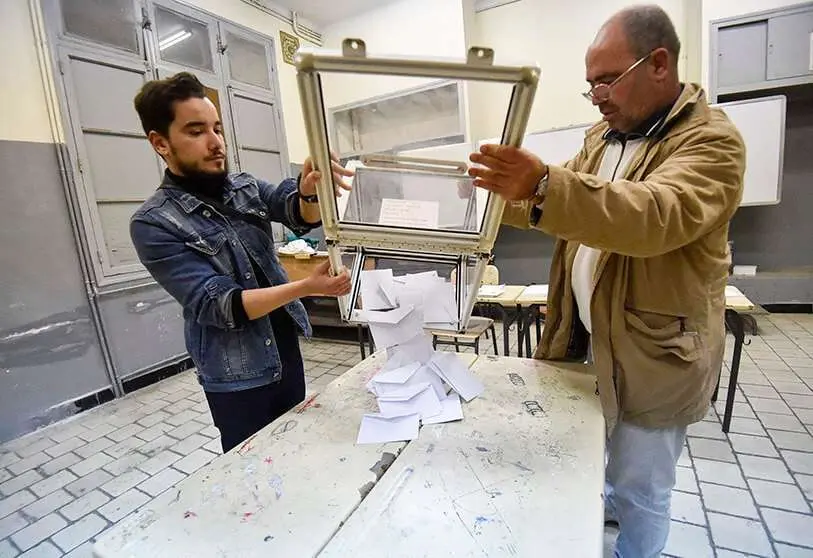High abstention and disinterest mark legislative elections in Algeria

The high abstention rate, the lack of interest and the citizen's weariness marked the legislative elections held this Saturday in Algeria, which the government presented as the end of a process of reforms initiated in April 2019 in search of the so-called "new Algeria", and which truly confirmed what was expected, a low turnout in line with the theses defended by the social protest movement Hirak and the opposition, which demanded a massive boycott of these elections and which seek the disappearance of the current regime installed after decades of control by the dominant party, the National Liberation Front, and above all by the army.
24 million Algerians were called to the polls this Saturday for early legislative elections that come within a political scenario marked by social protests led by the Hirak movement, which seeks political regeneration in the face of the omnipresence of the National Liberation Front and the army, considered by many media and analysts to be the real power elite.
Turnout in these early elections to the Algerian National People's Assembly barely exceeded 30 per cent, according to the latest estimates. Of the 24 million people called to the polls, less than a third turned out to vote. The figure was around 30 per cent, according to the Independent National Electoral Authority (ANIE), as published by Tout sur L'Algérie.
According to figures provided by ANIE President Mohammed Charfi, voter turnout abroad in Algeria was also very low, with a figure of less than 5 per cent. He did point out, however, that turnout in six of the country's provinces exceeded 50 per cent, although in seven others it was below 20 per cent. The ANIE could take several days to have the final results of the vote, Mohammed Charfi admitted on Saturday.

The last elections held before these legislative elections following the departure from power of former president Abdelaziz Bouteflika in April 2019 were marked by a low turnout; with abstention at 60% in the election of Abdelmadjid Tebboune as president of the Republic of Algeria and 76% in the consultation on the reform of the Constitution last November.
President Abdelmadjid Tebboune played down the low turnout in Saturday's elections, saying that for him "the turnout does not matter". "What matters to me is that those for whom the people vote have sufficient legitimacy," Tebboune said, according to EFE news agency.
The population has shown great disinterest in these legislative elections, the first to be held since Bouteflika's resignation two years ago, which has resulted in a very high abstention rate.
Election day was marked by calls for a boycott by opposition parties and the Hirak protest movement, which described the elections as a masquerade or a hoax.
For the government, these elections were meant to be an example of President Abdelmadjid Tebboune's "new Algeria", with an emphasis on young and non-elite candidates. There were, however, aspects of the past, with the police crackdown on opposition demonstrations.

Most Hirak officials chose not to appear publicly after the large number of arrests in recent weeks, which even extended to the run-up to the elections.
According to the Committee for the Defence of Hirak Detainees, thousands of people have been arrested, hundreds of them have been tried and convicted and dozens more remain in prison, mostly under pre-trial detention, as EFE news agency reported. As reported by the Europa Press agency, several activists were arrested in the run-up to Saturday's elections, including Karim Tabbou, one of the exponents of the Hirak movement, and journalists Khaled Drareni and Ihsan el Kadi.
In the capital Algiers, which was taken over by police and secret services in the early hours of the morning, turnout was also very low.

The President of the Republic of Algeria, Abdelmadjid Tebboune, had announced new political reforms to build the 'new Algeria' once he assumed power in December 2019 and after the referendum to reform the Constitution and the dissolution of Parliament. All of this with the declared aim of implementing the political reforms demanded by a citizenry fed up with the economic crisis the country has been going through, marked by the fall in energy market prices (the main source of financing for the North African nation), and also exhausted by the cases of corruption denounced for many years in the political sphere and by what it understands to be the same ruling class installed in power.
Algeria's president, who many continue to link to the old National Liberation Front leadership, and the army leaders who back him had in mind parliamentary elections as a way to end more than two years of protests. Aware of the serious social, political and economic crisis the country is going through, and unable to stop a movement that has been demanding the fall of the military regime that has dominated Algeria since independence from France in 1962 since it erupted in February 2019, the government had proposed these elections as a way to dismantle the Hirak. The aim was to give a new impetus to the "new Algeria" announced by Abdelmadjid Tebboune himself.








